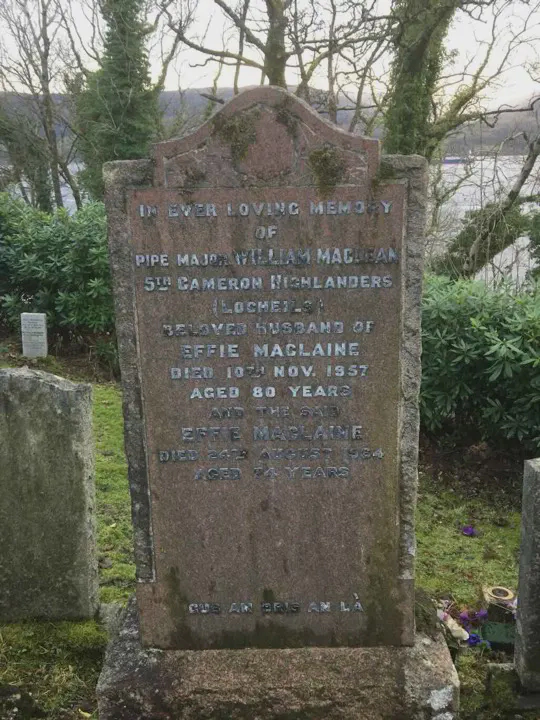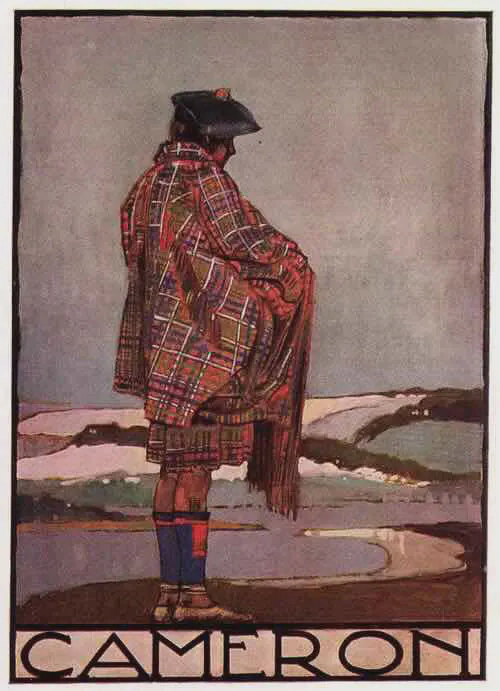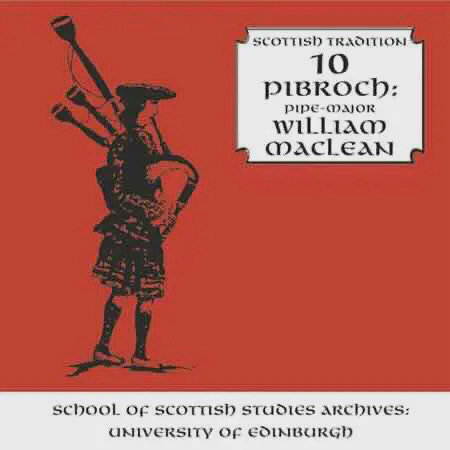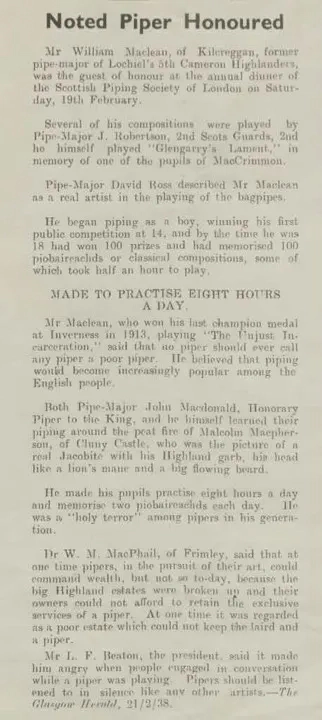Bagpiper William MacLean (1876 – November 10, 1957) was born in Tobermory, Isle of Mull to Raasay parents.
He was instructed by the great Malcom MacPherson (Calum Piobaire) at the same time as John Macdonald of Inverness. Served in the Queens Own Cameron Highlanders, as Pipe Major and was recognized as one of the finest piobaireachd players of his day.

William died on November 10, 1957 and was buried in Barbour Cemetery, Kilcreggan, Argyll and Bute, Scotland
Kilcreggan is a village located on the Rosneath Peninsula in Argyll and Bute, Scotland. It sits on the eastern shore of the Gare Loch, a sea loch on the west coast of Scotland.
- Pupil of Malcolm MacPherson (Calum Piobaire) of Badenoch
- He made a special study of piobaireachd
- Pipe Major of The 5th Cameron (Lochiel) Highlanders during the First World War
Won all the major prizes of the early 1900s.
- Argyllshire Star at Oban (1898)
- Inverness Champion’s Gold Medal of The Highland Society of London (1901)
- Highland Society of London Champion’s Gold Medal for Piobaireachd at Oban (1912)
- Inverness Ex-Champion’s Class (1913).
- He also won prizes for March, Strathspey and Reel.
- Regarded by some as one of the best piobaireachd players of the first half of the 20th Century

Military
- MacLean volunteered 1914.
- Initially he was P/M of 3/4th Camerons and became P/M of 5th Camerons 1917.
- He and his pipers led the battalion into Germany playing the ‘March of the Cameron Men’ and ‘All the Blue Bonnets’.

William MacLean - Pibroch
Scottish Tradition Series vol 10
The recordings on this album were made in the early 1950s and include examples of complete piobaireachd tracks, plus sections of piobaireachd and one track of canntaireachd. The album will be sought after by many pipers and in particular those with a particular interest in piobaireachd.
CD1:
- Interview
- The Finger Lock
- Donald of Laggan
- Lament For The Laird of Annapool
- The Desperate Battle
- Catherine’s Lament
- The Old Woman’s Lullaby (canntaireachd)
- The Old Woman’s Lullaby (pipes)
- MacLeod’s Salute
- The King’s Taxes.
CD2:
- Lament For Donald Dougal MacKay
- Cill Chriosd
- MacLeod of Raasay’s Salute
- The Battle of Vaternish
- The Gathering of Clan Chattan
- The Earl of Seaforth’s Salute
- Duntroon’s Salute
- The Unjust Incarceration
- Lament For Patrick Og MacCrimmon
- Too Long In This Condition.
William MacLean - Pibroch - Greentrax

Noted Piper Honoured (The Glasgow Herald March 21, 1938)
Mr William Maclean, of Kilcreggan, former pipe-major of Lochiel’s 5th Cameron Highlanders, was the guest of honour at the annual dinner ofthe Scottish Piping Society of London on Saturday, 19th February.
Several of his compositions were played by Pipe-Major J. Robertson, 2nd Scots Guards, 2nd he himself played “Glengarry’s Lament," in memory of one of the pupils of MacCrimmon.
Pipe-Major David Ross described Mr Macleanas a real artist in the playing of the bagpipes.
He began piping as a boy, winning his first public competition at 14, and by the time lie was 18 had won 100 prizes and had memorised 100 piobaireachds or classical compositions, some ofwhich took half an hour to play.
MADE TO PRACTISE EIGHT HOURS A DAY.
Mr Maclean, who won his last champion medal at Inverness in 1913, playing “The Unjust Incarceration, ”said that no piper should ever call any piper a poor piper. He believed that piping would become increasingly popular among the English people.
Roth Pipe-Major John Macdonald, Honorary Piper to the King, and he himself learned their piping around the peat fire of Malcolm Macpherson, of Cluny Castle, who was the picture of a real Jacobite with his Highland garb, his headlike a lion’s mane and a big flowing beard.
He made his pupils practise eight hours a day and memorise two piobaireachds each day. He was a “holy terror” among pipers in his generation.
Dr W. M. MacPhail, of Frimley, said that at one time pipers, in the pursuit of their art, could command wealth, but not so today, because the big Highland estates were broken up and their owners could not afford to retain the exclusive services of a piper. At one time it was regarded as a poor estate which could not keep the laird and a piper.
Mr L. F. Beaton, the president, said it made him angry when people engaged in conversation while a piper was playing. Pipers should be listened to in silence like any other artist.

